Member functions can be overloaded; but member functions can only overload other member functions of this class. Member functions of a class are not related to ordinary non-member functions and functions declared in other classes, and they cannot be overloaded.

Member functions can be overloaded
Member functions can only overload other member functions of this class. Member functions of a class are not related to ordinary non-member functions and functions declared in other classes, and they cannot be overloaded. The same rules apply to overloaded member functions as to ordinary functions: the number and type of formal parameters of two overloaded members cannot be exactly the same. The function matching process used for calls to non-member overloaded functions also applies to calls to overloaded member functions.
Define overloaded member functions
To illustrate overloading, two overloaded members of the Screen class can be given to return a specific character from the window. Of the two overloaded members, one version returns the character indicated by the current cursor, and the other returns the character at the specified row and column:
class Screen {
public:
typedef std::string::size_type index;
// return character at the cursor or at a given position
char get() const { return contents[cursor]; }
char get(index ht, index wd) const;
// remaining members
private:
std::string contents;
index cursor;
index height, width;
};Like any overloaded function, provide the appropriate number and Type of actual parameters to choose which version to run:
Screen myscreen; char ch = myscreen.get();// calls Screen::get() ch = myscreen.get(0,0); // calls Screen::get(index, index)
Recommended tutorial: "c Video Tutorial"
The above is the detailed content of Can member functions be overloaded?. For more information, please follow other related articles on the PHP Chinese website!
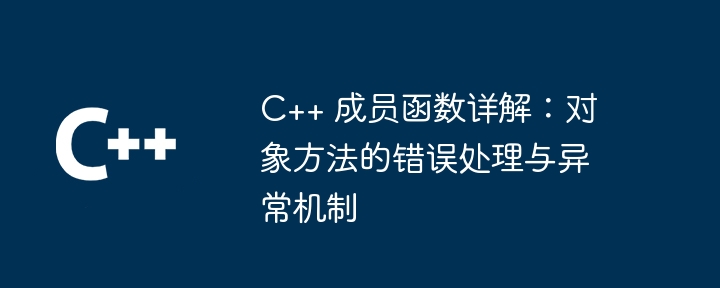 C++ 成员函数详解:对象方法的错误处理与异常机制Apr 29, 2024 pm 01:54 PM
C++ 成员函数详解:对象方法的错误处理与异常机制Apr 29, 2024 pm 01:54 PMC++成员函数中错误处理机制有错误码、断言及异常机制。错误码直接返回错误值;断言检查假设条件,不成立则抛出异常;异常捕获严重错误,通过try-catch块处理。实战案例中,Vector类的push_back()函数在容量不足时抛出std::bad_alloc异常,使用者可通过try-catch捕获并处理异常。
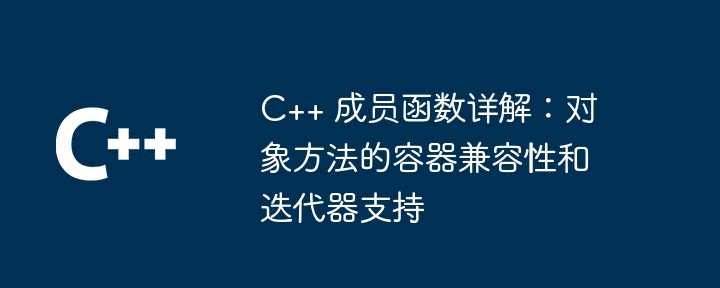 C++ 成员函数详解:对象方法的容器兼容性和迭代器支持Apr 29, 2024 pm 01:00 PM
C++ 成员函数详解:对象方法的容器兼容性和迭代器支持Apr 29, 2024 pm 01:00 PM成员函数是定义在类上下文中,与对象相关联的函数,可访问对象数据和方法。为了使其与容器兼容,自定义类必须提供赋值运算符、相等和不相等运算符、比较运算符。此外,为了支持迭代器,类应提供返回指向容器起始和终止元素迭代器的begin()和end()函数,以及解引用和递增迭代器的运算符。
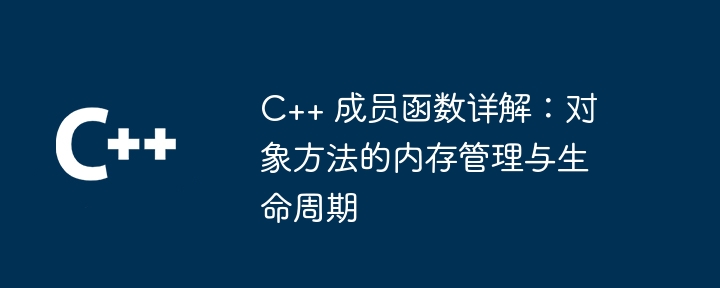 C++ 成员函数详解:对象方法的内存管理与生命周期Apr 29, 2024 pm 02:12 PM
C++ 成员函数详解:对象方法的内存管理与生命周期Apr 29, 2024 pm 02:12 PM成员函数内存管理与生命周期:内存分配:成员函数在对象创建时分配内存。对象生命周期:成员函数与对象绑定,对象创建时创建,对象销毁时销毁。构造函数:在对象创建时调用,用于初始化数据。析构函数:在对象销毁时调用,用于释放资源。
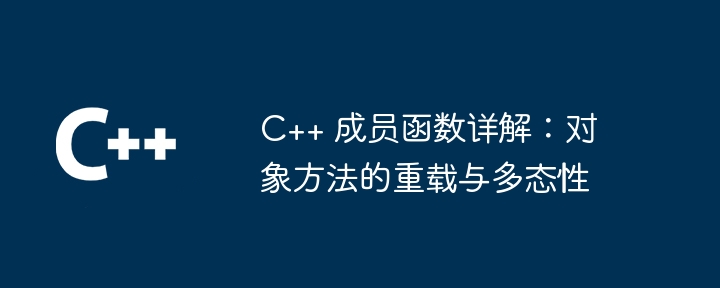 C++ 成员函数详解:对象方法的重载与多态性Apr 30, 2024 am 08:48 AM
C++ 成员函数详解:对象方法的重载与多态性Apr 30, 2024 am 08:48 AM成员函数重载允许为同一类定义同名函数,区分依据是参数和返回值类型。多态性允许派生类对象通过继承基类方法表现出不同的行为,当基类引用指向派生类对象时,调用基类方法将执行与对象类型匹配的派生类实现。重载和多态性在虚拟机实现指令集方面发挥着至关重要的作用,通过重载支持根据指令类型执行不同操作,而多态性支持不同类型的指令表现出不同的行为。
 如何重载 golang 函数?Apr 28, 2024 am 09:27 AM
如何重载 golang 函数?Apr 28, 2024 am 09:27 AMGo中不支持传统函数重载,但可以通过以下技术模拟:多返回值:方法签名相同但返回类型不同的函数可实现重载。可变参数:使用...语法创建接收可变数量参数的函数,允许处理不同签名的方法调用。
 golang函数重载与多态的区别?Apr 30, 2024 am 09:30 AM
golang函数重载与多态的区别?Apr 30, 2024 am 09:30 AMGo语言中不支持函数重载,因为它采用鸭子类型,根据实际类型确定值类型。而多态则通过接口类型和方法调用实现,不同类别的对象可以以相同方式响应。具体来说,Go语言中通过定义接口并实现这些方法,可以使不同类型的对象拥有相似行为,从而支持多态。
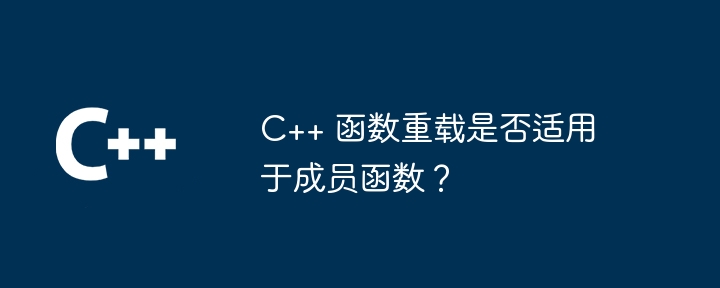 C++ 函数重载是否适用于成员函数?Apr 13, 2024 pm 06:15 PM
C++ 函数重载是否适用于成员函数?Apr 13, 2024 pm 06:15 PM是的,函数重载适用于成员函数,但受到以下限制:重载的成员函数必须具有不同的参数签名(类型和数量)。重载的成员函数不能具有相同的返回类型和不同的参数签名。
 Go 语言中的多态和重载怎样实现?Jun 10, 2023 am 10:25 AM
Go 语言中的多态和重载怎样实现?Jun 10, 2023 am 10:25 AMGo语言作为一门静态类型语言,看似不能像动态语言那样实现多态和重载。但是,Go语言利用接口的特性实现了多态,而重载的实现则更加简单和精准。实现多态的方法Go语言中的接口可以在调用过程中实现多态,接口可以描述一个对象的行为,任何实现了接口所有方法的类型都可以称之为该接口类型的实例。通过这种方式,只需定义好接口类型,实现不同的具体类型,就可以实现多态。下面是一个


Hot AI Tools

Undresser.AI Undress
AI-powered app for creating realistic nude photos

AI Clothes Remover
Online AI tool for removing clothes from photos.

Undress AI Tool
Undress images for free

Clothoff.io
AI clothes remover

AI Hentai Generator
Generate AI Hentai for free.

Hot Article

Hot Tools

SAP NetWeaver Server Adapter for Eclipse
Integrate Eclipse with SAP NetWeaver application server.

Dreamweaver Mac version
Visual web development tools

ZendStudio 13.5.1 Mac
Powerful PHP integrated development environment

Atom editor mac version download
The most popular open source editor

SublimeText3 Linux new version
SublimeText3 Linux latest version






